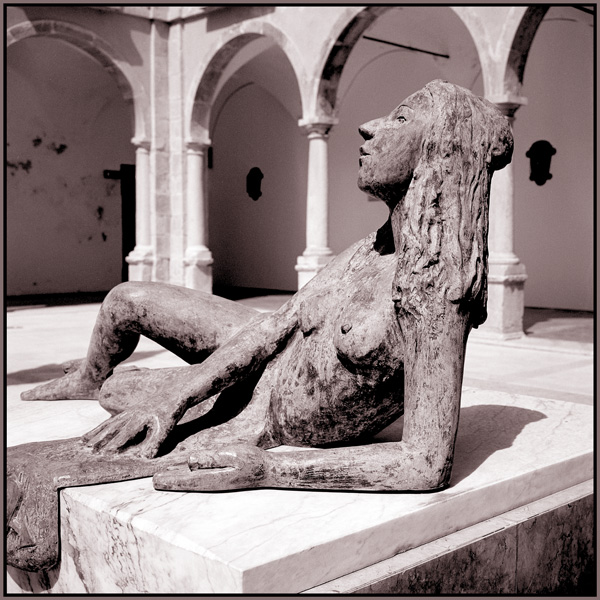Sculpture of a naked woman
This sculpture is situated in a courtyard at Pousada Tavira
Hotel Convent da Graca.
This Hotel was once the Convent of the Cloistered Augustinian Nuns, founded by King D. Sebastiao around 1569.
It stands on the castle hill on the site of what was once most likely the Jewish quarter. Its most noteworthy features are the 16th and 17th Century Renaissance cloister, the facade facing the main square and the central staircase, both in baroque style.
During its careful renovation, several archaeological traces of Islamic origin were discovered. As a result, the plans were changed in order to incorporate these important findings in the renovated building. They are now partially visible from the bar.
Following the restoration there is now a multi-purpose function room in the old church.
Tavira is a very typical city in the Algarve, it has been influenced by many civilizations; it was once a Phoenician village, it was habited by the Romans and it was an important city during the Muslim occupation.
Sculpture of a naked woman
This sculpture is situated in a courtyard at Pousada Tavira
Hotel Convent da Graca.
This Hotel was once the Convent of the Cloistered Augustinian Nuns, founded by King D. Sebastiao around 1569.
It stands on the castle hill on the site of what was once most likely the Jewish quarter. Its most noteworthy features are the 16th and 17th Century Renaissance cloister, the facade facing the main square and the central staircase, both in baroque style.
During its careful renovation, several archaeological traces of Islamic origin were discovered. As a result, the plans were changed in order to incorporate these important findings in the renovated building. They are now partially visible from the bar.
Following the restoration there is now a multi-purpose function room in the old church.
Tavira is a very typical city in the Algarve, it has been influenced by many civilizations; it was once a Phoenician village, it was habited by the Romans and it was an important city during the Muslim occupation.

Sculpture of a naked woman
This sculpture is situated in a courtyard at Pousada Tavira
Hotel Convent da Graca.
This Hotel was once the Convent of the Cloistered Augustinian Nuns, founded by King D. Sebastiao around 1569.
It stands on the castle hill on the site of what was once most likely the Jewish quarter. Its most noteworthy features are the 16th and 17th Century Renaissance cloister, the facade facing the main square and the central staircase, both in baroque style.
During its careful renovation, several archaeological traces of Islamic origin were discovered. As a result, the plans were changed in order to incorporate these important findings in the renovated building. They are now partially visible from the bar.
Following the restoration there is now a multi-purpose function room in the old church.
Tavira is a very typical city in the Algarve, it has been influenced by many civilizations; it was once a Phoenician village, it was habited by the Romans and it was an important city during the Muslim occupation.